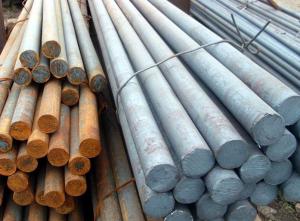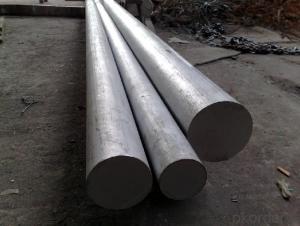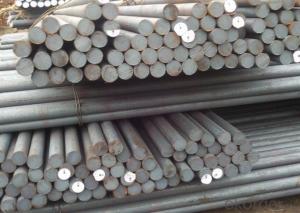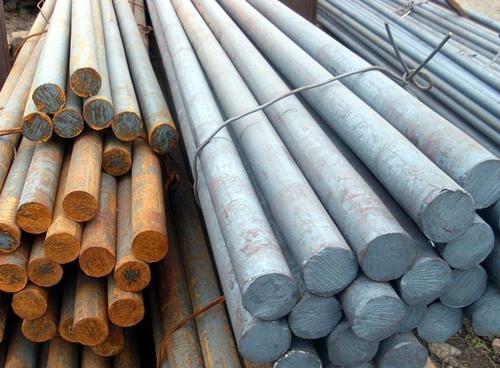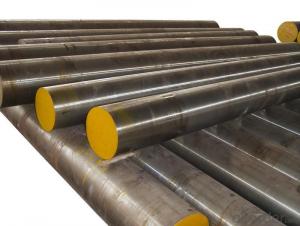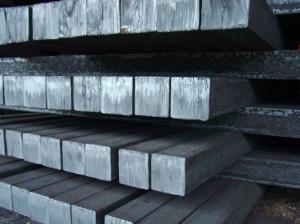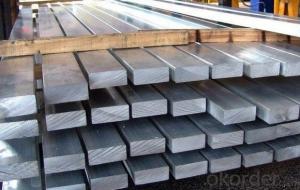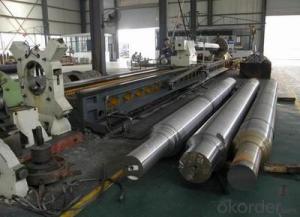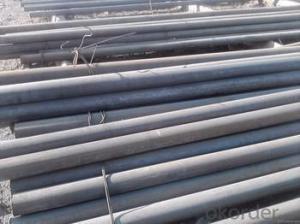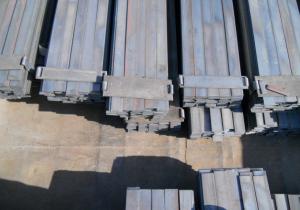Q235 stainless round steel bar for construction
- Loading Port:
- Tianjin
- Payment Terms:
- TT OR LC
- Min Order Qty:
- 25000 m.t.
- Supply Capability:
- 10000 m.t./month
OKorder Service Pledge
OKorder Financial Service
You Might Also Like
Usage and Applications
These steels are used for ball and roller bearing applications and are comprised of low carbon steels and high carbon through harden able steel.
First the famous 1C-1.5Cr steel from which the majority of bearings are made. Its structure is apparently well-understood and the focus is on purity in order to avoid inclusions which initiate fatigue during rolling contact. Then there is the M50 steel and its variants, from which bearings which serve at slightly higher temperatures in aeroengines are manufactured, based on secondary-hardened marten site.
Tapered roller bearing are generally used to support combined load mainly consisting of radial load. Their cups are separable for easy assembling ,During mounting and using, radial clearance and axial clearance can be adjusted and preloaded mounting can be made.
Packaging & Delivery
Packaging Detail: ASTM 52100 Steel in seaworthy packing or on customer request; Packed in bundles with standard export sea-worthy package or as customer require
Delivery Detail: 45 days after confirmed
Trade terms: FOB, CFR, CIF ou as customer's required
MOQ: 25 tons or at customer's demands. If the quantity is good, the price will be better.
Production Flow of Chinese Standard Round Bar
1. The common processes are preheated forging quenching, dual refinement solution process, cooling quenching and isothermal quenching. We use heat treatment for dual refinement solution process.
2. Material prepare (billet) — heat up — rough rolling — precision rolling — cooling — packing — storage and transportation
Characteristics of Chinese Standard Round Bar
1. The steel in which the main interstitial alloying constituent is carbon in the range of 0.12–2.0%.
2. As the carbon percentage content rises, steel has the ability to become harder and stronger through heat treating; however it becomes less ductile.
3. Quality should be in conformity with the specification of the manufacturer. Quantity and packing conditions should be in conformity with the term in the contract.
4. Regardless of the heat treatment, higher carbon content reduces weld ability. In carbon steels, the higher carbon content lowers the melting point.
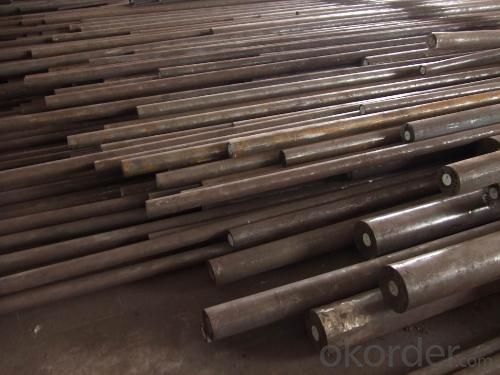
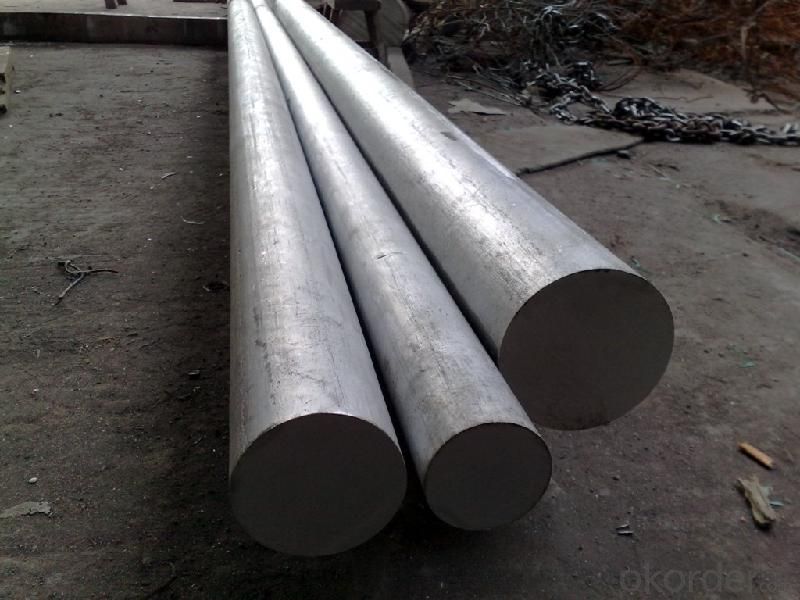
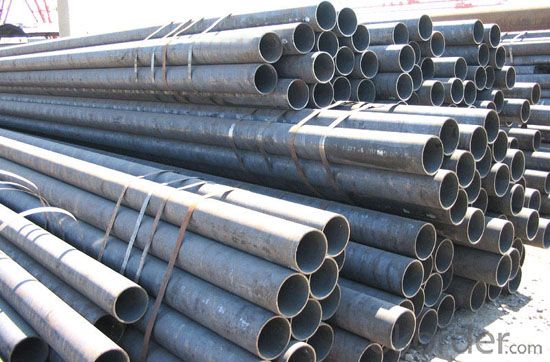
- Q: What are the environmental benefits of using steel round bars?
- There are several environmental benefits of using steel round bars. Firstly, steel is a highly recyclable material, which means that using steel round bars can help reduce the demand for new raw materials and decrease the amount of waste sent to landfills. Additionally, steel production processes have significantly improved in recent years, resulting in lower emissions of greenhouse gases and air pollutants. Steel is also durable and long-lasting, reducing the need for frequent replacements and saving valuable resources. Overall, the use of steel round bars can contribute to a more sustainable and eco-friendly construction industry.
- Q: Can steel round bars be used for shafting applications?
- Yes, steel round bars can be used for shafting applications. Steel round bars are commonly used as shafting material in various industries such as automotive, construction, and manufacturing. They offer high strength, durability, and excellent mechanical properties, making them suitable for transmitting power and rotational motion in machines and equipment. Steel round bars can be machined to precise dimensions, heat-treated for increased hardness, and coated to provide corrosion resistance. Additionally, they are available in different grades and alloys to meet specific application requirements. Overall, steel round bars are a reliable choice for shafting applications due to their inherent strength and versatility.
- Q: How do you determine the appropriate steel grade for a specific application?
- To determine the appropriate steel grade for a specific application, it is necessary to have a comprehensive understanding of the application's requirements and the properties of different steel grades. The following steps should be considered: 1. Begin by clearly defining the specific requirements of the application, such as load-bearing capacity, corrosion resistance, temperature resistance, and durability. Take into account factors such as the environment the steel will be exposed to, the expected stress levels, and any specialized characteristics needed. 2. Research the various steel grades available in the market once the application requirements are understood. Identify steel grades known for possessing the desired properties required for the specific application. Consult industry standards, expert opinions, and available resources to gain insights into different steel grades and their performance in similar applications. 3. Analyze the physical, mechanical, and chemical properties of the steel grades under consideration. Evaluate key properties such as strength, ductility, toughness, hardness, corrosion resistance, weldability, and formability. Compare these properties with the application requirements to determine which steel grades align best with the specific needs. 4. Evaluate the cost and availability of the steel grades that meet the application requirements. Take into account factors such as the initial cost, maintenance costs, and availability of the steel grade in the required form and quantity. This step ensures that the chosen steel grade is not only suitable but also feasible from an economic perspective. 5. Seek advice from experts, such as metallurgists or engineers, to gain valuable insights into selecting the appropriate steel grade. Their expertise and experience can help weigh the pros and cons of different steel grades, identify potential challenges, and suggest alternatives or modifications if necessary. 6. If feasible, conduct testing or trials using samples of the selected steel grade to assess its performance under real-world conditions. This step can help validate the suitability of the chosen steel grade and identify any unforeseen issues or areas for improvement. By carefully considering the application requirements, researching steel grades, evaluating material properties, considering cost and availability, seeking expert advice, and conducting testing and trials, one can effectively determine the appropriate steel grade for a specific application.
- Q: Can steel round bars be used for making hydraulic cylinders or pistons?
- Yes, steel round bars can be used for making hydraulic cylinders or pistons. Steel is a commonly used material in hydraulic systems due to its strength, durability, and ability to withstand high pressure. The round shape of the bars allows for easy machining and shaping into the desired cylinder or piston components.
- Q: What are the advantages of using high-strength steel round bars?
- There are several advantages to using high-strength steel round bars in various applications. Firstly, high-strength steel round bars are known for their exceptional strength-to-weight ratio. This means that even though these bars are lighter in weight compared to other materials, they possess a significantly higher strength. This advantage allows for the construction of structures that are both sturdy and lightweight, making them ideal for applications where weight reduction is crucial, such as in the aerospace and automotive industries. Secondly, high-strength steel round bars offer excellent resistance to wear, fatigue, and impact. This characteristic makes them highly durable and able to withstand heavy loads and repeated stress, enhancing the overall lifespan and performance of structures or components made from these bars. This advantage is particularly beneficial in applications such as construction, where the materials are subjected to extreme conditions and must maintain their structural integrity over time. Furthermore, high-strength steel round bars provide improved design flexibility due to their versatility. They can be easily shaped, machined, and welded, allowing for the creation of complex and customized structures or components. This advantage enables engineers and designers to optimize their designs and achieve specific performance requirements, resulting in more efficient and innovative solutions. In addition, high-strength steel round bars offer enhanced resistance to corrosion, making them suitable for applications where exposure to harsh environmental conditions or corrosive substances is a concern. By utilizing high-strength steel round bars, structures or components can maintain their integrity and functionality for extended periods, reducing the need for frequent maintenance and replacement. Finally, using high-strength steel round bars can lead to cost savings in the long run. Although the initial cost of these bars might be higher compared to other materials, their superior strength and durability can significantly reduce maintenance, repair, and replacement costs over time. Additionally, the lightweight nature of high-strength steel round bars can contribute to fuel efficiency, resulting in cost savings in transportation and other industries. Overall, the advantages of using high-strength steel round bars include high strength-to-weight ratio, excellent resistance to wear and fatigue, improved design flexibility, enhanced corrosion resistance, and potential cost savings. These benefits make high-strength steel round bars a preferred choice for a wide range of applications, ranging from construction and manufacturing to transportation and infrastructure.
- Q: Are steel round bars resistant to corrosion?
- Yes, steel round bars can be resistant to corrosion depending on the type of steel and the environment they are exposed to. Stainless steel round bars, for example, contain chromium which forms a thin passive layer on the surface that protects against corrosion. This layer is self-repairing and provides excellent resistance to corrosion in many environments, including moisture, chemicals, and saltwater. However, carbon steel round bars are not inherently corrosion-resistant and may require additional protective coatings or treatments to prevent corrosion. Therefore, it is important to consider the specific type of steel and the intended application when determining the corrosion resistance of steel round bars.
- Q: Are steel round bars suitable for heat exchanger applications?
- Heat exchanger applications can benefit from the use of steel round bars. Steel is a widely utilized material in various industries, including heat exchangers, because of its exceptional thermal conductivity and strength. The round shape of the bars simplifies their fabrication and installation in heat exchanger systems. For applications requiring heat exchange, like power plants, chemical processes, HVAC systems, and refrigeration units, steel round bars are ideal as they efficiently transfer heat between two fluids. Moreover, steel provides good corrosion resistance, which is crucial for heat exchangers that encounter different fluids. By implementing proper design and material selection, steel round bars can reliably withstand high temperatures and pressure differentials in heat exchanger applications.
- Q: Can steel round bars be used in the manufacturing of architectural features?
- Yes, steel round bars can certainly be used in the manufacturing of architectural features. Steel is a versatile and durable material that can be shaped and formed into various architectural elements such as columns, beams, handrails, and decorative features. Its strength and resistance to corrosion make it suitable for both structural and decorative purposes in the construction of buildings and other architectural designs.
- Q: Can steel round bars be used in the oilfield equipment industry?
- Yes, steel round bars can be used in the oilfield equipment industry. Steel round bars are commonly used in the oilfield industry due to their high strength, durability, and resistance to corrosion. They are used to manufacture various components and equipment such as drill collars, drill bits, valves, and pump shafts. The use of steel round bars ensures that the equipment can withstand the harsh conditions and extreme pressures encountered in oilfield operations. Additionally, steel round bars can be easily welded and machined to meet specific requirements, making them a versatile choice for the oilfield industry.
- Q: What are the advantages of using steel round bars?
- There are several advantages of using steel round bars in various applications. Firstly, steel round bars are known for their exceptional strength and durability. This makes them ideal for use in construction projects, as they can withstand heavy loads and provide structural integrity. Additionally, steel round bars have excellent resistance to corrosion, making them suitable for outdoor and marine applications. They can withstand exposure to harsh weather conditions and remain unaffected by moisture and chemicals. This ensures a longer lifespan and reduced maintenance costs. Steel round bars also offer versatility in terms of their shape and size. They can be easily customized and fabricated to meet specific requirements, making them suitable for a wide range of applications. Whether it's for construction, manufacturing, or engineering projects, steel round bars can be tailored to fit the desired dimensions and specifications. Furthermore, steel round bars have excellent machinability, allowing for easy cutting, drilling, and shaping. This makes them highly adaptable and easy to work with, saving time and effort during the fabrication process. Moreover, steel round bars have a high tensile strength, which means they can resist deformation under pressure. This makes them ideal for applications where a high level of strength is required, such as in the manufacturing of machinery, tools, and automotive components. Lastly, steel round bars are cost-effective compared to other materials. Their durability and long lifespan result in reduced maintenance and replacement costs over time. Additionally, their availability and widespread use make them a cost-efficient option for various industries. Overall, the advantages of using steel round bars include their exceptional strength, resistance to corrosion, versatility, machinability, high tensile strength, and cost-effectiveness. These qualities make them a popular choice in numerous applications, contributing to their widespread usage in industries worldwide.
Send your message to us
Q235 stainless round steel bar for construction
- Loading Port:
- Tianjin
- Payment Terms:
- TT OR LC
- Min Order Qty:
- 25000 m.t.
- Supply Capability:
- 10000 m.t./month
OKorder Service Pledge
OKorder Financial Service
Similar products
Hot products
Hot Searches
Related keywords
